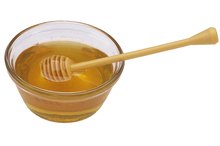Good Diets for Kickboxing
Modern kickboxing began in the 1970s when competitive karate bouts allowed punches and kicks that made the sport full contact. Combining martial arts with boxing created a hybrid that burns over 700 calories per hour for a 30-year-old, 190 lb., 6-foot-tall male. Kickboxing will help burn slightly fewer calories for most women because of their smaller size, but it is still a great workout for all of the muscle groups. Working out at this intensity requires a diet that helps maintain your strength and endurance. Be sure to consult your doctor before undertaking a dietary change.
Champ's Advice
European kickboxing champion Billy Murray followed a diet which kept his weight down and his energy high. Murray recommends you review your dietary needs with a specialist like a nutritionist or dietitian before making changes to your eating plan, to follow the best program for your personal needs. Murray's diet kept him at fighting weight for 26 years so he shares the specifics with the boxers he now trains.
Breakfast
What Is the Subway Diet?
Learn More
For breakfast, Murray combines different carbohydrates for immediate energy. Choose from muesli, corn flakes or all-bran cereals, plus fruit, toast with honey or low-fat butter spread and liquid — tea, skim milk or water. The Colorado State's article "Nutrition for the Athlete" suggests endurance athletes like kickboxers eat a diet containing around 70 percent of calories from carbs for two or three days before an event or fight. The article also credits the Olympic Training Center in Colorado Springs for confirming that high-carbohydrate diets provide athletes with stamina to perform longer than high-protein diets.
- For breakfast, Murray combines different carbohydrates for immediate energy.
- The Colorado State's article "Nutrition for the Athlete" suggests endurance athletes like kickboxers eat a diet containing around 70 percent of calories from carbs for two or three days before an event or fight.
Lunch
After a mid-morning snack of fruit or yogurt plus liquids, choose a sandwich on whole-wheat bread with low-fat condiments and either chicken or tuna. Include vegetables like lettuce, tomatoes, onions, cucumbers and peppers on your sandwich to add nutrients with few extra calories. High expenditure of calories through exercise may increase your need for protein, but Colorado State University claims Americans eat more than enough protein already and a varied diet will provide you all your protein needs, making protein supplements unnecessary.
Dinner
Bill Pearl Diet
Learn More
For your evening meal, Murray recommends varying combinations of baked potatoes, basmati rice, baked or grilled chicken, turkey or fish and salad, plus fruit or yogurt and more liquids. He also suggests an evening snack no later than 9:30 p.m. that consists of a piece of whole-wheat toast with low-fat spread or a small banana. Colorado State warns not to let your fat intake drop below 15 percent, because less fat intake may hinder your performance.
Cautions
While Murray's diet plan is similar to Colorado State University's suggested diet for athletes, the university's recommendations include additional calories from extra servings of cheese, cookies, fruit and bread throughout the day. The university also cautions athletes to stay well-hydrated before, during and after events and both sources agree you should avoid caffeine, sugar, alcohol and fried foods. Consult your physician before changing your diet.
Related Articles
References
Writer Bio
Writing since 1978, Allison Stevens was writer and publisher of the Calvary Christian Fellowship newsletter and has had work appear in various online publications. Stevens has certification to teach group fitness and is a licensed Zumba instructor, teaching fitness classes for adults and children daily. She enjoys researching various subjects including health, and holds an Associate of Arts.









